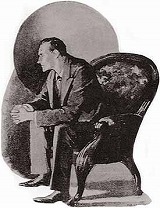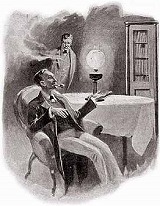
Sherlock Holmes sat for some time in silence, with his head sunk forward and his eyes bent upon the red glow of the fire. Then he lit his pipe, and leaning back in his chair he watched the blue smoke-rings as they chased each other up to the ceiling.
“I think, Watson,” he remarked at last, “that of all our cases we have had none more fantastic than this.”

“Save, perhaps, the Sign of Four.”
“Well, yes. Save, perhaps, that. And yet this John Openshaw seems to me to be walking amid even greater perils than did the Sholtos.”
“But have you,” I asked, “formed any definite conception as to what these perils are?”
“There can be no question as to their nature,” he answered.
“Then what are they? Who is this K. K. K., and why does he pursue this unhappy family?”
Sherlock Holmes closed his eyes and placed his elbows upon the arms of his chair, with his finger-tips together. “The ideal reasoner,” he remarked, “would, when he had once been shown a single fact in all its bearings, deduce from it not only all the chain of events which led up to it but also all the results which would follow from it. As Cuvier could correctly describe a whole animal by the contemplation of a single bone, so the observer who has thoroughly understood one link in a series of incidents should be able to accurately state all the other ones, both before and after. We have not yet grasped the results which the reason alone can attain to. Problems may be solved in the study which have baffled all those who have sought a solution by the aid of their senses. To carry the art, however, to its highest pitch, it is necessary that the reasoner should be able to utilize all the facts which have come to his knowledge; and this in itself implies, as you will readily see, a possession of all knowledge, which, even in these days of free education and encyclopaedias, is a somewhat rare accomplishment. It is not so impossible, however, that a man should possess all knowledge which is likely to be useful to him in his work, and this I have endeavoured in my case to do. If I remember rightly, you on one occasion, in the early days of our friendship, defined my limits in a very precise fashion.”
“Yes,” I answered, laughing. “It was a singular document. Philosophy, astronomy, and politics were marked at zero, I remember. Botany variable, geology profound as regards the mud-stains from any region within fifty miles of town, chemistry eccentric, anatomy unsystematic, sensational literature and crime records unique, violin-player, boxer, swordsman, lawyer, and self-poisoner by cocaine and tobacco. Those, I think, were the main points of my analysis.”